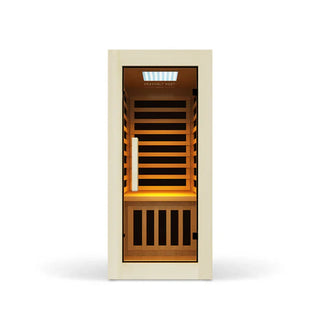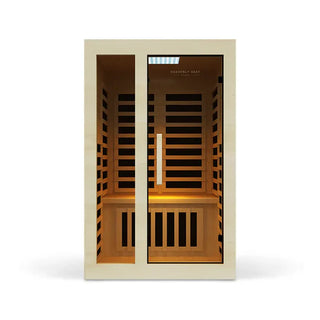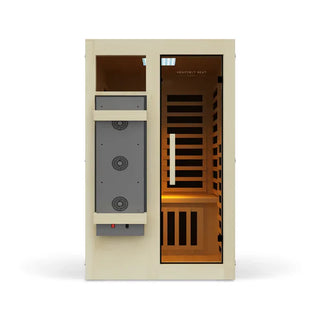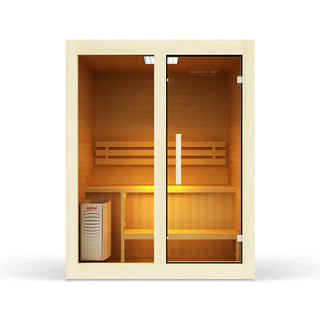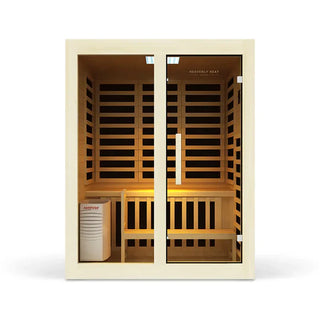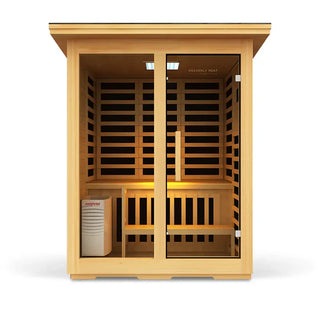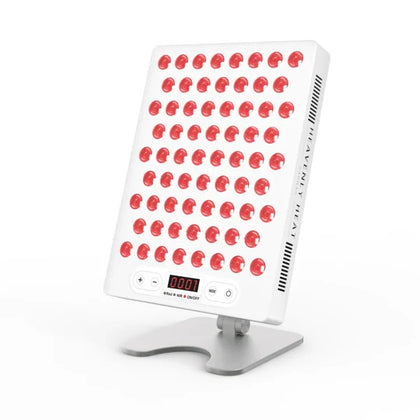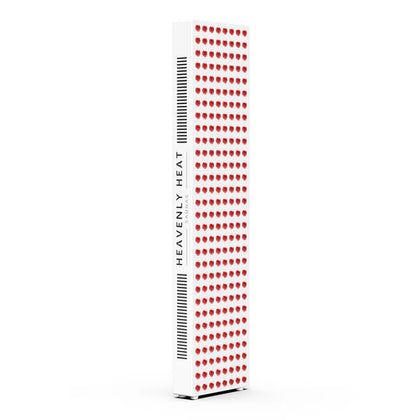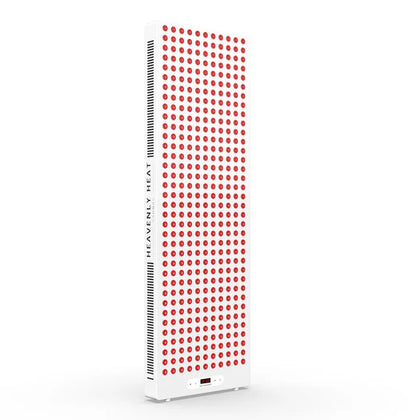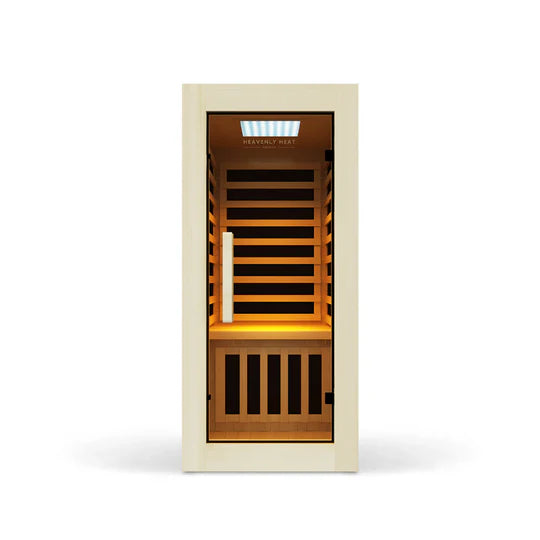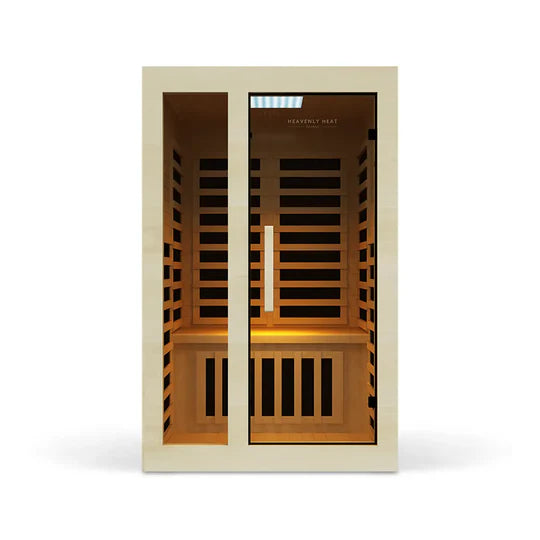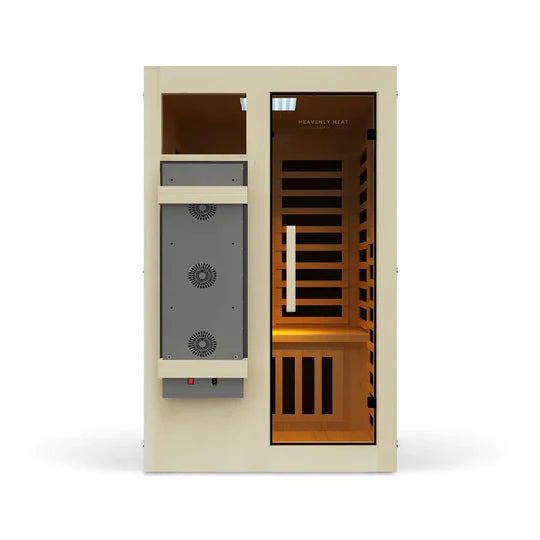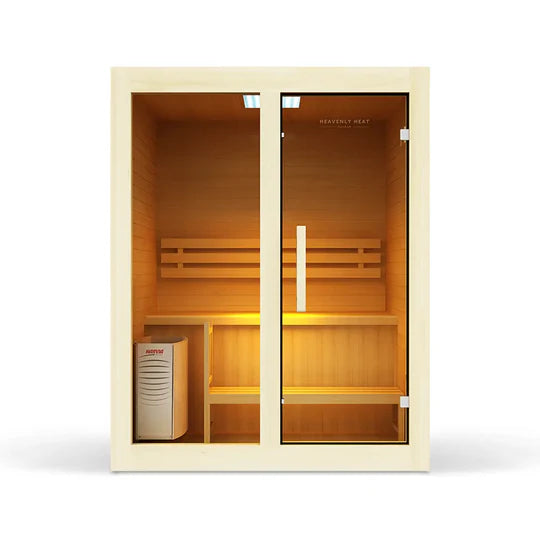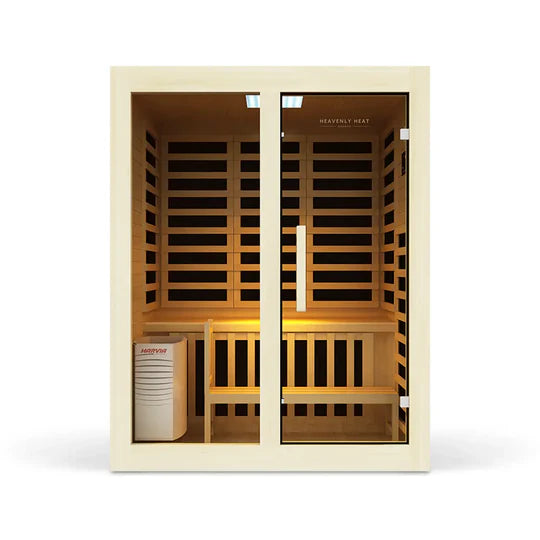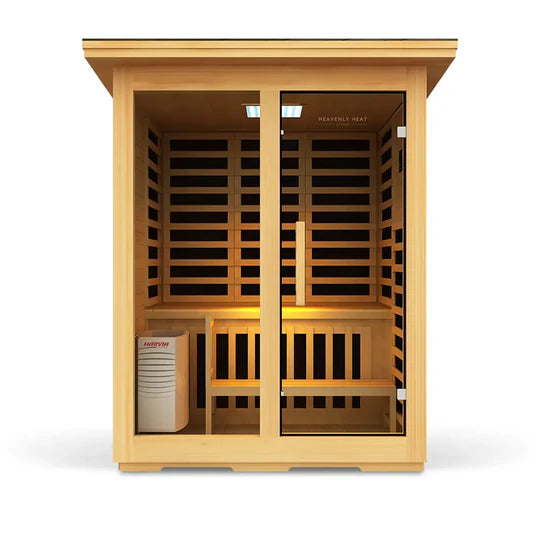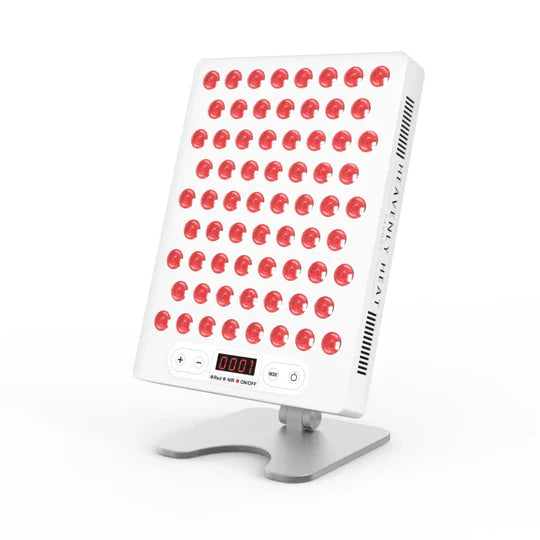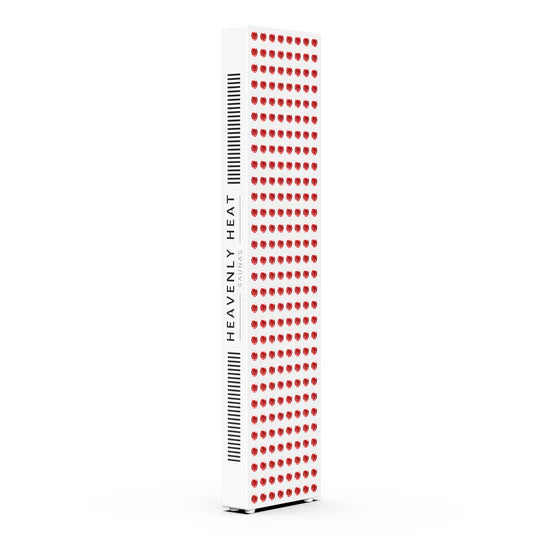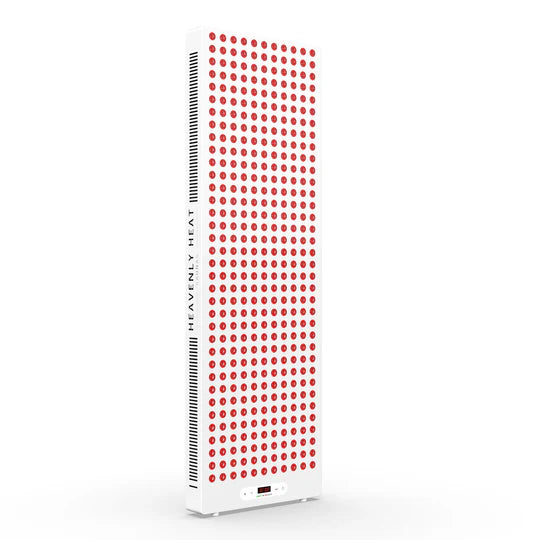Morning Sauna Benefits: Boost Your Day with Productivity & Wellness

Table of contents
Struggling with sluggish mornings and low energy? That groggy feeling makes it hard to start the day right and can affect your productivity.
Ignoring it only makes things worse. But there is a simple way to wake up feeling refreshed and ready to go. It all starts with a morning sauna session.
Key Takeaways:
Boost your circulation and cardiovascular health with a morning sauna session.
Relieve muscle soreness and reduce inflammation for quicker recovery.
Enhance mental clarity and focus by reducing stress and brain fog.
Strengthen your immune system and improve your mood with regular sauna use.
Stay hydrated and avoid overexertion to prevent dehydration and fatigue.
Benefits of Using a Sauna in the Morning
Improved Circulation and Cardiovascular Health
- Heat in the sauna helps blood flow better: Sauna use makes blood vessels widen, which raises your heart rate just like when you do light exercise.
- Better blood flow makes the heart stronger: This improved circulation helps your heart work better and keeps your heart healthy over time.
- Sauna heat can be risky for some heart patients: If you have heart problems, sauna heat may be too much strain, talk to your doctor before using a sauna regularly.
- Feeling energized after sauna means better circulation: After a sauna session, I feel more awake and full of energy because my blood is moving faster.
- Warmth naturally wakes up your blood flow: A doctor once explained how warmth improves circulation, and now I’ve experienced exactly how true that is.
Enhanced Muscle Recovery and Pain Relief
- Sauna heat helps muscles relax and ease soreness: A sauna session is an excellent way to relieve muscle tension and reduce soreness. The heat helps relax tight muscles, easing discomfort from exercise or chronic pain .
- Better blood flow helps muscles heal faster: Increased blood circulation encourages faster healing of muscle tissues and reduces stiffness. A study showed that far-infrared sauna use after endurance training improved muscle recovery by enhancing jump performance (p < 0.05).
- Traditional sauna raises heart rate more than infrared sauna: Traditional Finnish saunas increase heart rate more than far-infrared saunas, showing that different sauna types affect the heart in different ways (p < 0.05).
- Regular sauna sessions lower inflammation and joint pain: Using a sauna regularly can reduce inflammation from arthritis or sports injuries, supporting healthier muscles and joints.

Boosted Metabolism and Fat Burning
- Sauna Heat Raises Your Metabolism: The heat from the sauna raises your body temperature, which activates special proteins that help control your energy use.
- Sauna Helps Release Fat-Burning Hormones: Using a sauna triggers growth hormone release, which helps burn fat and repair muscles faster.
- Heat Can Turn On Fat That Burns Calories: Regular sauna use may activate brown fat, a type of fat that burns calories to keep your body warm.
- Sauna Makes Your Body Better at Using Sugar: Heat exposure improves how your body handles blood sugar, similar to what happens with exercise.
- Sweating in Sauna Causes Temporary Weight Loss: Sweating during sauna sessions makes you lose body weight temporarily, and this effect depends on your body size.
- People with Higher Body Weight Lose More Water: Studies show that people with higher BMI lose more water weight in the sauna compared to those with lower BMI.
- It’s Important to Drink Water After Sauna: Since you lose a lot of fluid in the sauna, especially if you have a higher BMI, drinking water afterward is very important.
- Regular Sauna Sessions Help With Weight and Health: When combined with a healthy lifestyle, regular sauna use can help you lose weight and improve your metabolism.
Increased Mental Clarity and Focus
- Heat from the sauna helps you think more clearly: A morning sauna session triggers brain chemicals like norepinephrine, which make you feel more awake, alert, and focused, without the crash that caffeine can cause.
- The sauna helps clear your mind when you feel foggy: If you wake up with brain fog, the heat and increased blood flow from a sauna can help refresh your mind and improve how well your brain works.
- Feeling relaxed helps you concentrate better: Using the sauna lowers stress by reducing cortisol levels, which helps your mind feel calm and ready to focus on tasks without getting overwhelmed.
- A clear and focused mind helps you work better: Many people feel tired at work, which affects memory and focus. A morning sauna session can help reset your mind and improve how well you perform on the job.

Strengthened Immune System Function
Regular sauna use strengthens the immune system by increasing the production of white blood cells, the body’s defense against illness.
Heat exposure triggers mild stress on the body, training it to become more resilient to infections.
Many people report fewer colds and illnesses when they use a sauna consistently.
Elevated Mood and Stress Reduction
- Starting your morning in the sauna helps you feel emotionally balanced: If you wake up feeling stressed or anxious, a short sauna session can help bring your emotions back into balance by calming your nervous system.
- Heat from the sauna makes you feel naturally happier: Heat exposure triggers your body to release endorphins, natural “feel-good” chemicals, which instantly boost your mood and help you feel better.
- A calm mind leads to clearer thinking and better focus: Using a sauna regularly helps your brain shift into a relaxed state, making it easier to think clearly, stay focused, and respond more quickly to daily tasks.
- Saunas reduce stress by lowering your stress hormone: The heat helps regulate cortisol levels, which is the hormone linked to stress. Lower cortisol makes it easier to stay calm during a busy or challenging day.
- A few quiet minutes in the sauna can lift your mood: Even just a short time in the sauna can leave you feeling more relaxed, positive, and emotionally refreshed before starting your day.
- Sweating in the sauna helps your body clean itself naturally: When you sweat, your body pushes out toxins and waste through your skin . This natural detox can help improve how your skin looks and feels.
- The way you sweat affects how well you detox heavy metals: Studies show sweating from physical activity like running removes more harmful metals than sitting still. So combining a sauna with movement may help your body detox better.
- Simple skin care before and after sauna makes a big difference: Washing your face before the sauna, staying hydrated, and cleaning your skin afterward helps remove toxins, prevent breakouts, and keep your skin glowing and healthy.

Morning vs. Evening Sauna: Which Is Best?
Both morning and evening sauna sessions offer unique benefits. Morning saunas can jumpstart your day, increasing energy and focus.
They help you feel energized and mentally prepared for the challenges ahead. Evening saunas, on the other hand, are great for unwinding and relieving the day's stress.
They promote better sleep by relaxing the body and mind, allowing you to end your day on a peaceful note.
How Long and Hot Should Your Morning Sauna Be?
- Most people feel great with 10 to 20 minutes in the sauna: A short morning sauna session between 10 to 20 minutes helps improve blood flow and gives your body a strong, energizing start, without wearing you out.
- Starting with just 5 to 10 minutes is safer for beginners: If you’re new to saunas, it’s best to start with 5 to 10 minutes so your body can slowly get used to the heat without feeling overwhelmed.
- Fitter people can usually handle more heat and time: If you're in good shape or used to saunas, you might be able to enjoy longer sessions or a bit more heat without feeling tired or uncomfortable.
- Traditional saunas feel hotter, infrared ones are gentler: Traditional saunas work best at 150°F to 175°F (65°C–80°C) , while infrared saunas feel easier on the body and are effective at 120°F to 140°F (50°C–60°C) .
- Lower heat is better if you want to stay in longer: If you plan to stay in the sauna longer than usual, it's smart to keep the heat moderate , too much heat can leave you feeling drained instead of refreshed.
- A shorter, hotter session often works better than a long one: In the morning, less is often more , a short but warm session can wake you up and boost your energy better than staying too long and overheating.
Possible Risks of Using a Sauna in the Morning
Increased Risk of Dehydration and Overheating
Morning sauna use can lead to dehydration: Your body loses fluids through sweating, and overnight dehydration makes it worse.
Lack of hydration before a sauna session may cause discomfort: Symptoms include dizziness, dry mouth, and fatigue.
Overheating is a risk, especially on an empty stomach: Without energy from food, your body may struggle to regulate temperature.
Lightheadedness and fainting can occur: Sudden drops in blood pressure can make you feel weak or unsteady.
Stay safe with proper hydration: Drink water before and after your sauna session to prevent dehydration and fatigue.
Elevated Stress on the Cardiovascular System
- Using a sauna in the morning makes your heart work harder: When you step into a hot sauna first thing in the day, your heart has to pump faster to cool your body down. This puts extra pressure on your cardiovascular system, especially when it’s not fully active yet.
- Some people may feel their heartbeat acting strangely: For certain individuals, the added stress can lead to irregular heartbeats. This is your heart reacting to the sudden increase in workload.
- Switching from hot to cold adds even more pressure on your heart: Going from a hot sauna directly into a cold shower may sound refreshing, but it actually shocks your system. The sudden change can put extra strain on your heart and blood vessels.
- Regular sauna use can train your heart to handle stress better: Although it’s intense in the beginning, using a sauna regularly can improve how your heart responds to stress over time. It helps your cardiovascular system become more flexible and resilient.
- Feeling dizzy or weak means your heart may be under too much pressure: If you get lightheaded or uncomfortable during or after a sauna, that’s your body warning you. These signs mean the heat might be too much for your heart to handle.
- People with heart issues should talk to a doctor before using a morning sauna: If you have high blood pressure or a heart condition, the morning sauna can be risky. Always check with a doctor before adding it to your routine.
Potential for Lightheadedness and Dizziness
- Feeling dizzy happens often when using a sauna in the morning: Many people feel dizzy after using a sauna in the morning, especially if they haven’t eaten yet.
- Heat in the sauna can lower your blood pressure and make you weak: When your body heats up, blood pressure can drop, making you feel weak or unsteady.
- Cooling down slowly helps avoid sudden dizziness: A sudden temperature change can make dizziness worse, so take a lukewarm shower instead of going into a cold place right away.
- Not drinking enough water makes dizziness worse: Dehydration affects how well your blood moves, which can make you feel lightheaded.
- Eating a small snack before helps keep your energy steady: Having a little food before the sauna stops you from feeling weak or dizzy.
- Sit down and leave the sauna if you still feel dizzy: If you feel lightheaded, sit down right away and leave the sauna if it doesn’t get better.
Negative Impact on Blood Sugar Levels
Heat exposure affects blood sugar levels, which can be risky for some people. A sauna session in the morning may cause a sudden drop in blood sugar, leading to weakness or shakiness.
For others, the stress of heat can temporarily spike blood sugar levels. This can be concerning for diabetics or those sensitive to blood sugar changes.
If you’re prone to low blood sugar, eat a balanced meal before using a sauna and monitor how your body reacts.
Increased Risk of Skin Irritation and Sensitivity
Sauna heat can make your skin more sensitive, especially in the morning when it has just gone through overnight repair.
Sweating can strip away natural oils, leaving your skin dry or irritated. Some people experience redness or rashes after a sauna session due to increased blood flow to the skin.
If you have sensitive skin, apply a light moisturizer afterward to help retain moisture. Avoid harsh soaps or scrubbing immediately after using a sauna, as your skin barrier is more fragile in the morning.
Disrupted Sleep Patterns and Fatigue
- Sitting in a sauna early can make you feel more tired than relaxed: While saunas are known for their calming effects, using one in the morning might leave you feeling drained instead of energized. The heat can lower your blood pressure for a short time, making you feel weak or sleepy after the session.
- The heat can confuse your body’s natural sleep and energy timing: Using a sauna in the morning may throw off your internal clock. The high heat affects your cortisol levels, the hormone that helps you feel awake, potentially leaving you more tired during the day.
- Feeling low after sauna? You may just need water and food: If you feel wiped out after a morning sauna, your body might just need a quick reset. Drinking enough water and eating a healthy meal can help bring your energy levels back.
- Pay attention to how your body reacts and change your schedule if needed: Not everyone reacts the same way to morning sauna use. If it leaves you feeling off or overly tired, consider moving your sauna sessions to a different time of day that suits your body better.
Complications for Individuals with Pre-Existing Conditions
- People with heart problems can feel worse in morning sauna heat: If you have high blood pressure, heart disease, or diabetes, using a sauna in the morning can put extra stress on your body and may not be safe.
- Morning sauna can make breathing harder for people with lung issues: Conditions like bronchitis or asthma may get worse in the hot, humid air of a sauna, leading to discomfort or difficulty breathing.
- If you deal with anxiety, sauna heat can feel like a panic attack: The heat in a sauna can trigger physical sensations, like a fast heartbeat or shortness of breath, that feel similar to anxiety or panic symptoms.
- Your kidneys may struggle if they’re already weak: Using a sauna causes the body to lose fluids through sweat, and this can put extra strain on your kidneys, especially if you already have kidney issues.
- It’s safer to check with your doctor before using a morning sauna: If you have any medical condition, it's best to talk to a doctor first to avoid health risks from using a sauna in the morning.
How to Add a Sauna to Your Morning Routine?
Choose the Right Type of Sauna
- The best sauna depends on your space and lifestyle: When adding a sauna to your morning routine, it’s important to think about how much room you have, how much you’re willing to spend, and what kind of experience you enjoy. The right sauna should suit your home and your daily rhythm.
- Infrared saunas save time and energy in the mornings: Infrared saunas heat up quickly and don’t use much electricity, which makes them a smart choice if your mornings are busy and you don’t want to wait around.
- Steam saunas give a calm start but need more time: Steam saunas create a warm, humid feeling that’s relaxing, but they take longer to get ready. They’re better if your mornings are slow and you enjoy a calm, spa-like start.
- Traditional saunas are powerful but need more effort: Traditional saunas give off a strong, dry heat that many people love for detoxing. But they take more time and energy to run, so they might not be ideal for everyday use.
- Infrared is often the easiest sauna to install at home: If you're setting up a sauna at home, infrared is usually the most convenient choice. It’s compact, heats fast, and doesn’t need a complicated setup, great for small spaces.
- Steam saunas can work in apartments with good planning: If you live in an apartment , a steam sauna might still be possible. Just be sure your space can handle moisture and that there’s enough ventilation to keep things safe and comfortable.
Set a Consistent Schedule
- Doing it at the same time every morning makes it easier to stick to: When you choose a fixed time, like right after waking up or before breakfast, it helps your body know what to expect, making it easier to follow every day.
- After two weeks, it starts feeling natural and enjoyable: Most people find that once they stick to it for a couple of weeks, the sauna becomes something they look forward to instead of a task.
- Even if your routine changes, try not to skip it: You can shift the timing if needed, but skipping days makes it harder to build the habit, so stay regular, even on busy mornings.
Prepare Your Body for the Heat
- Getting ready the right way helps your body handle the sauna heat: Before you step into the sauna, take a moment to prepare. Remove anything you’re wearing, like jewelry , watches , glasses, or contact lenses. These items can heat up and cause discomfort or even burns. Leaving behind metal objects and electronics also keeps your session distraction-free and more relaxing.
- What you leave out keeps you safe and focused: Don’t bring phones , water bottles, or anything metal into the sauna. These can heat up quickly and become dangerous. Skipping them also helps you stay present and enjoy the quiet, calm atmosphere.
- Drinking water helps your body deal with the heat: Hydration is key. Try to drink at least 8 ounces of water before entering the sauna. It helps your body sweat properly and keeps you from getting lightheaded or dehydrated.
- Taking a quick shower helps your skin respond better: A short shower before your sauna session can open up your pores and allow your body to sweat more freely. It’s a small step that boosts the sauna’s benefits.
- Your energy levels decide how well you’ll handle the heat: If you didn’t sleep well or you’re feeling run down, your body might not tolerate the heat as well. Pay attention to how you feel and don’t push it, some days, it’s better to skip or shorten the session.
- Listening to your body is the smartest way to use the sauna: As you use the sauna more often, your body will get used to the heat. But even then, it’s important to stop if you feel dizzy, weak, or unwell. Knowing your limits keeps the experience safe and enjoyable.
- A few simple habits make your sauna time more powerful: Preparing your body properly makes each session more effective. With the right steps, your morning sauna can leave you feeling refreshed, focused, and ready for the day.
Cool Down and Rehydrate
After your sauna session, don’t rush back into your routine. Cooling down helps your body return to normal gradually.
Taking a cool shower or sitting in a lower-temperature space can help ease the transition.
Drinking water right after can prevent dehydration. For best results, try sipping water slowly over 10-15 minutes.
This way, you avoid shocking your system while replenishing lost minerals, leaving you feeling refreshed and energized for the day ahead.
Pair It with Mindfulness or Productivity
- Breathing slowly in the sauna helps clear your head: Focusing on your breath while sitting in the warmth can calm your mind and improve your focus. This simple habit makes it easier to think clearly and stay on track throughout the day.
- Starting your day in the sauna keeps your mood steady: A quiet sauna session in the morning helps you feel more in control and relaxed. That calm feeling can stay with you, even when work or life gets stressful.
- Mindfulness in the sauna can lift your mood: Taking a few quiet minutes to be present while you sit in the heat isn’t just relaxing—it can actually improve your mental health and leave you feeling better all day.
FAQs
Can a morning sauna improve workout performance later in the day?
A morning sauna can enhance workout performance by boosting circulation, delivering more oxygen and nutrients to muscles for improved endurance and strength. It also increases flexibility, reduces stiffness, and helps regulate cortisol for steady energy. For better workouts, a morning sauna is a smart move.
How does a morning sauna impact hormone levels, such as cortisol and testosterone?
A morning sauna helps regulate cortisol, preventing sharp spikes that cause anxiety and promoting a steady release to keep stress in check. It also supports testosterone production by improving circulation and reducing stress. Compared to evening sessions, morning saunas are more effective for stabilizing cortisol and sustaining energy levels throughout the day.
Is a morning sauna beneficial for cognitive function and productivity?
A morning sauna boosts focus by increasing blood flow and oxygen to the brain, improving mental clarity. It reduces stress hormones, keeping you calm and enhancing productivity. Starting your day with a sauna promotes better concentration and efficiency.
What is the best way to hydrate before and after a morning sauna session?
A morning sauna session jumpstarts your day by clearing your mind, boosting circulation, and increasing energy. The heat elevates heart rate, improves blood flow, and enhances metabolism, aiding calorie burn and overall health.


